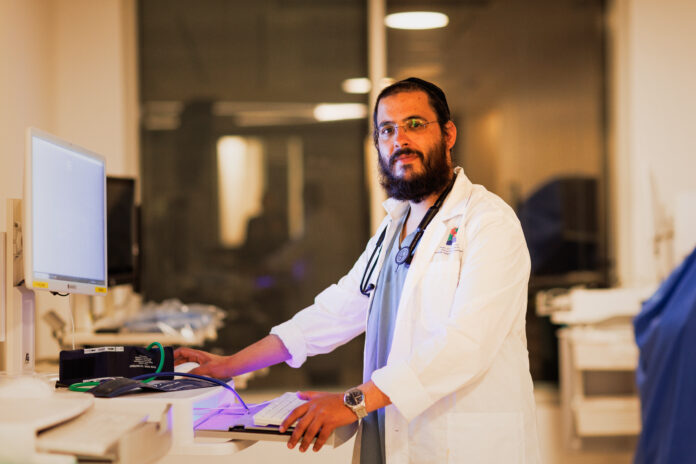After pursuing his lifelong dream of becoming a doctor, Yehuda Sabiner, an ardent Gerrer chasid and resident of Bnei Brak, made history when he began his internship at Israel’s Sheba Medical Center, just when the pandemic hit. Sheba went into emergency mode and created Israel’s first COVID-19 ward. Bravely and tirelessly treating patients who had contracted the deadly disease, he kept the leading poskim in Eretz Yisrael abreast of the latest developments and measures required to prevent its spread, especially Rav Yitzchok Zilberstein. Today, Dr. Yehuda Sabiner specializes in pediatrics at the Schneider Children’s Hospital of Israel, where he continues to combine halachah and medicine and guide the community on these two frequently interrelated subjects.
As a chasidishe medical professional, you are undoubtedly a standout. What do you think you give back specifically to the chareidi community, of which you are a proud member?
As a practicing physician, which I have been for the past three years, I treat everyone, but it often means treating people from my own community. I find that they often feel more comfortable speaking to me than to a doctor from a different background.
I was once called in to attend a very difficult and complicated C-section as the baby’s pediatrician, which is my specialty. I had nothing to do with the surgery itself, but as soon as I walked in and the relatives saw my beard, they immediately came over and asked if I’m chareidi. I said yes, and they asked which rabbanim I consult with in regard to halachah. I told them Rav Yitzchok Zilberstein and Rav Mendel Shafran, and after that they felt much more at ease. They were very happy to be able to make appropriate decisions according to halachah and medicine at the same time.
Every time I speak to Rav Yitzchok Zilberstein, he tells me, “Are you aware that if you lived in Prague they would call you ‘Moreinu Rav Yehuda Sabiner’? Because the same Torah that says we have to keep Yom Kippur also says that we have to ask the doctor for his professional opinion whether or not this particular person can fast.”
But these are just minor examples. Then there are the larger examples of dealing with things like the pandemic that affected the community at large.
Before Shabbos Zachor 2020 [at the beginning of the Covid outbreak], Rav Zilberstein issued a psak that according to the knowledge that had reached him, the coronavirus had not yet reached the category of a mageifah. Accordingly, aside from those who were required to go into quarantine because they had returned from certain countries, everyone was obligated to hear Parshas Zachor and the Megillah, and b’rov am hadras melech.
On my first day of internship at Sheba Medical Center, I walked into my department and couldn’t find the director, so I had to speak to his deputy. She informed that the State of Israel had just decided that our department was going to be the first to treat the coronavirus if it ever came to Israel. This was before there was even one confirmed case in the country. Then she said, “You’re going to have to make a decision whether or not you want to work here.” This was at a time when the whole world was starting to panic, so I discussed it with my wife, and we decided that if Hashem had chosen to give me this “zechus,” I wasn’t going to run away from it. I ended up being the third doctor in Israel to treat a Covid patient.
In the beginning, we had a building outside the regular Sheba complex set aside for infected patients, and we were visited by senior politicians and army officials to discuss what equipment was needed and how we were going to treat the virus. We were informed that the Mossad had arranged to bring in ventilators. We were also told things that the media wasn’t allowed to report and that even most doctors in other hospitals didn’t know about.
On Shabbos, during the seudah, I related what we were preparing for and what was already happening in other countries. After Shabbos, my brother, who is a big talmid chacham and a maggid shiur, called me and told me about Rav Yitzchok’s psak. By then I already knew Rav Yitzchok for a couple of years and I had his mazkir’s number, so I called to ask about this psak. The mazkir told me, “He sat with around 20 doctors before he issued the psak. Do you know something that they don’t?” I replied, “I believe that I do, because those doctors haven’t visited our department, and they don’t know the updated information. I think it would be kedai for me to visit the rav and tell him what I know.” He gave me an appointment.
It took less than two minutes to explain what I knew. Rav Yitzchok immediately summoned his mazkir and told him to call Yated and Hamodia to tell them not to print his psak. He then wrote a different psak that anyone who doesn’t listen to the orders of the Health Ministry is a rotzei’ach and a shofeich damim. At that point, I started to get nervous because I hadn’t expected him to respond so sharply. After all, there had only been one or two people with confirmed cases of Covid at that point. When he saw my reaction, he said, “Is everything you told me true?” “Yes,” I replied. “In that case, this is where things are going to end up.” As soon as he had the updated information, he understood the situation far better than I did through his koach haTorah.
To read more, subscribe to Ami





















